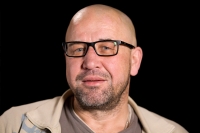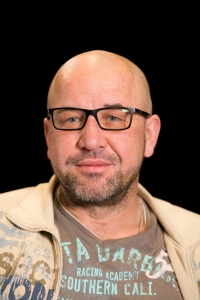“Then came November 27th and we found out that there would be this strike. It came through the 'telephone' as always, they 'phoned' us from the cell above us that there would be general strike. So as a cell commander I would step forward and say: 'We are calling a strike.' And he would look at me as if I lost my mind, that first lieutenant. He said: 'What do you mean? What strike?' - 'Well, a strike, we are declaring a hunger strike, so no food for us.'” - “You went on a hunger strike as a diabetic?” - “Sure. Diabetes was not the issue. And we all got together. Vietnamese, Gypsy, this Jirka, who had no arms, we all decided that we won´t eat. Anyway, they used to give us this mess tin, with this brown sauce and some pasta in it. And as I was a diabetic, they would give me this gram of meat or two, just a tiny slice, which we would share, everyone would get a piece, we would sit together, so everyone would know how did it taste like. So we were telling ourselves: 'We will survive a day or two without those delicacies of yours!' So we said that we are calling a hunger strike, we would announce it, so it would spread all across the corridor and everyone wanted to join us. Every cell decided to go on hunger strike, we would discuss it by this 'telephone', by toilet. Se we were waiting for them to bring us lunch. As we made the announcement before lunch, at 9AM, after breakfast, so we were quite full and it wasn´t so bad. And we were telling ourselves: 'Well, there will be a lunch which we will refuse to eat, dinner – well, that would be just a bread and butter anyway, so we could eat it in the morning. And the hunger strike will prevail – great, we won.' But they said: 'No, no, no, they ordered that you have to take it inside!' And they would bring us this plate with French fries on it, with fried cheese, tartar sauce a knife and fork, there was even a cucumber. So we were quite amazed, and I would say: 'I think I must be dreaming.' - 'You have to take it to your cell and if you wouldn´t want it, we would take it away.' So they gave us the food which we would put on a table. And I said: 'Boys, what kind of a provocation is this? That´s a provocation!' As there had never been such a thing as French fries on a regular plate. There had been no such a thing. And we all began to drool, we would heart that in cells next to us they already started eating, that everyone was eating, the whole corridor. 'Boys, we will prevail, we are fighters! I wont´t eat, I am on hunger strike!' And even I would like to taste a bit, of course. But no one in our cell would eat. And I am telling you the truth. I told them: 'Boys, I started it, so I would be really ashamed if we would give them back empty plates. Eat it, if you want, but I am on a hunger strike.' And no one would take just a tiny bit, I was so proud of them, of our boys, of our cell no. 97, as we were a good one. And after they came back, we would hand it over. And everyone would be like: 'Did you see the cheese? That would be something!' And everyone would whine how bad it was that we would have to eat just bread. But then, at 1PM or 2PM maybe, they cell door would open: 'Jelínek, pack your things, you are going home.' And I thought they would beat me up. As it indeed looked like I had it all planned out. That I was doing this freedom fighter act, knowing that in just two hours I would have this fried cheese in some pub, maybe two of them. 'You bastard, you knew!' And I would say: 'How could I? No way. I will have a fried cheese after I will get out, but I didn´t know, I swear.' So I packed my stuff and got out in just in sandals, without socks, and the snow was falling, so it was quite cold. I went to a railway station, broke, I had no money, as they took me from the factory during an afternoon shift.”


